Wisdom takes many forms, says Nick Page, including the words of scripture, the person of Jesus and our own ability to think for ourselves
Writing an article about wisdom may be one of the most stupid things I’ve ever done. I mean, most days I have imposter syndrome, but this time it is overwhelming. Because I don’t feel wise at all. I make snap judgements, I talk too much, I confidently issue opinions on subjects I know little about, I say ‘yes’ to things I shouldn’t (such as writing an article called ‘How to be wise’). I try to pursue what a colleague of mine calls ‘wisdomness’ but I am, and always will be, a recovering idiot.
Still, someone needs to talk about wisdom. For one thing, we are in the grip of a stupidity epidemic of unparalleled proportions. We dismiss experts and trust ‘influencers’. Politicians, media personalities and public figures make baffling, career-ending decisions. Nonsensical conspiracy theories and hopeless quack remedies are amplified by social media, the Large Hadron Collider of stupidity, spinning millions and millions of tiny stupid particles around the world at the speed of light.
Even in church we don’t seem to trust our own wisdom. I have spent hours in church meetings trying to discern whether some simple, probably quite good idea, was “what God wants us to do”. I have talked to many, many people who, after a decision they took went wrong, were now worried they were “outside the will of God”. Or who were utterly miserable in a job for which they were clearly unsuited, but to which they were convinced they had been ‘called’. We privilege revelation above wisdom. It’s so much easier when God takes away the terrible burden of having to decide for ourselves.
The only reason that older people might be wiser is because we’ve got more mistakes to reflect on
And when things do go wrong, we often look for spiritual causes: we weren’t listening enough; we didn’t spend enough time in prayer; the vicar has a hidden sin of some kind. All of those might be true (especially the bit about the vicar) but it might also be that it just wasn’t a very good idea.
I don’t want to be cynical. I believe that God speaks to people but also that, quite often, he doesn’t. I believe that God is Lord, but he’s not a micromanager. God is intensely interested in our lives, but I don’t think he cares what type of biscuit we buy, or what we have for breakfast (although he might want us to make sure nobody is being exploited or hurt by our choices – including us). I believe we are all loved, cherished, precious children of God. But I also believe he wants us to grow up a bit.
So, last year, I decided to embark on a year of wisdomness. A year to think about wisdom, to understand what it is and how one might accumulate it. I’ll be honest, it’s been an uphill battle. But I have found powerful teaching on which to draw. It lies in a field of Jewish and Christian thought which is, helpfully, labelled ‘wisdom’.
Thinking for ourselves
Wisdom is one of the major themes of the Bible, especially in the Old Testament. There is even a section called ‘wisdom literature’, which includes Psalms, Job, Ecclesiastes, Proverbs and Song of Songs. (I’m not sure this is entirely satisfactory as a collective title: many of the psalms seem emotionally unstable, while Song of Songs seems not so much wise as a bit overexcited. Not to mention obsessed with gazelles.) But there are two books which embody this wisdom tradition: Proverbs and Ecclesiastes. Proverbs is a collection of wisdom teaching: “for gaining wisdom and instruction…for receiving instruction in prudent behaviour, doing what is right and just and fair” (Proverbs 1:2–3).
It’s not an easy book to read. It’s a bit disjointed and there are strange verses which are a bit like: “Six things the Lord hates, seven things he really dislikes…” Ecclesiastes is even more startling. With its refrain of: “Everything is meaningless” (1:2), it’s like the Bible is having a mid-life crisis. Yet both books are vitally important because they remind us that, most of the time, we have to think for ourselves.
When God doesn’t intervene directly, when there is no prophecy to guide us, when a mysterious hand fails to appear during the PCC meeting to write instructions on the wall of the church hall, we are not left floundering. We’ve got wisdom for the times when God doesn’t tell us what to do.
And ‘do’ is the operative word. This is practical wisdom. It focuses on common, daily experiences. It’s not the mystical stuff that a lot of people understand by ‘seeking wisdom’ – you know, becoming enlightened or seeing into the true nature of reality. I know we can experience moments of ecstasy and wonder and awe. But, let’s be honest, no one can live on the mountaintop of mysticism all their life. Sooner or later, you have to come down and do the shopping. That’s why Proverbs contains verses like: “The Lord detests dishonest scales, but accurate weights find favour with him’ (11:1). Every trading standards office should have this one over the doorway.
This is do-able wisdom. And it’s the same kind of teaching that we get later in the Bible, from the greatest wisdom teacher of them all.
Wisdom is another name for Jesus
In Proverbs 8, the author personifies wisdom. She’s female and she has been there from the beginning (I have to admit, this part is a bit cosmic). “I was there when [God] set the heavens in place,” she says, “…and when he marked out the foundations of the earth” (Proverbs 8:27–29). This passage has been traditionally interpreted as a description of Jesus. It is one of the ideas that lie behind the opening of John’s Gospel, where Jesus is the word behind all things. According to this strain of theology, Jesus is, literally, wisdom on legs.
If we believe that Jesus was God incarnate, then, by definition, that makes him the wisest person who ever lived. The Church should be shouting about this. Jesus’ wisdom is the wisdom. And, like Proverbs, his wisdom is also practical. Love your enemies (Matthew 5:43-48). Forgive those who wrong you (Matthew 6:14). Don’t hit back (Matthew 5:38-40). Don’t put your trust in riches (Luke 12:32-34). Consider your own failings before you judge others (Matthew 7:1-6). It might be radical, challenging, countercultural, even shocking. It’s certainly hard. But it’s all do-able.
It is wonderful when God speaks to us and shows us the way to go; but when that doesn’t happen, don’t panic. We have Jesus. We have wisdom.
So how do we start to live this out? Here are some principles that I have drawn from my year of wisdomness.
Ways to be wise
“Six ways there are to be more wise, no, seven actually, I miscounted” (Wisdomness of Nick 8:10).
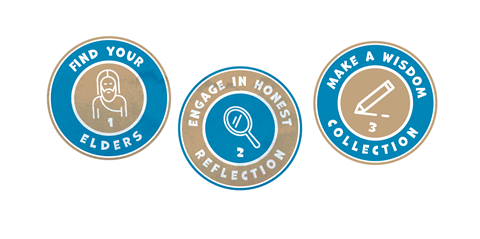
1. Find your elders
“Listen to advice and accept discipline, and at the end you will be counted among the wise” (Proverbs 19:20).
“Never turn down lunch with someone wise. Especially if they’re paying” (Wisdomness of Nick 8:11).
Find elders. I don’t necessarily mean the ones some churches have. I mean mentors. Guides. People from whom you can learn. In my life, I have been blessed to have had people who have invested in me, shared their wisdom and patiently listened the stupidity out of me. Find the voices and teachers who will mentor you. Even if you have to pick up the tab.
2. Engage in honest reflection
“Whoever heeds discipline shows the way to life, but whoever ignores correction leads others astray” (Proverbs 10:17).
“Squeeze the tube of your mistakes for the toothpaste of wisdom” (Wisdomness of Nick 10:10).
All of us grow old, but not all of us become elders. Wisdom is not an automatic benefit of ageing. You don’t get it with your bus pass and your pension. It comes through reflection. The only reason that older people might be wiser is because they’ve got more mistakes to reflect on. So, honour your mistakes. Draw all the wisdom you can from them. Journalling can help. Honest conversation with trusted friends is priceless. Prayer and time spent with God is vital.
3. Make a wisdom collection
“The wise store up knowledge…” (Proverbs 10:14a)
“…But fools stockpile toilet roll” (Wisdomness of Nick 20:94b).
Wisdom needs to be saved. Proverbs is a series of wisdom collections. Have you read or heard something which has had an impact on you? Store it. Study it. Chew it over. For years I have kept notebooks, snippets on my computer, loads of quotes and thoughts. The really powerful ones will stick with you.
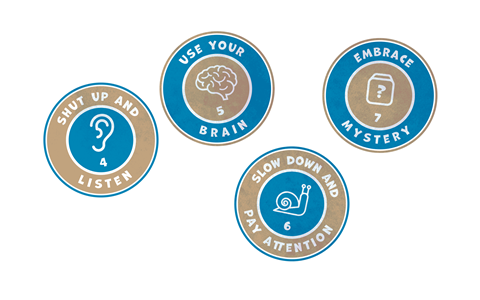
4. Shut up and listen
“The quiet words of the wise are more to be heeded than the shouts of a ruler of fools” (Ecclesiastes 9:17).
“Consider the lilies of the field. They don’t talk a lot. Or post on social media” (Wisdomness of Nick 17:4).
A lot of wisdom is about empathy – trying to see things from another’s point of view. But sometimes we can’t hear them over the noise of our own voice. Wise thinking requires us to listen. (My wife recently gave me a book called Invitation to Silence and Solitude [Ruth Haley Barton, IVP]. I think she’s trying to tell me something.)
5. Use your brain
“Leave your simple ways and you will live; walk in the way of insight” (Proverbs 9:6).
“There is miraculous stuff going on between your ears” (Wisdomness of Nick 104:16).
Sometimes, someone says: “Is this your idea? Or God’s idea?” To which the answer is nearly always: “I haven’t got a clue. I just thought it was a good idea.” Be open to God stopping what you are doing. Pray about it always. Talk through your plans and your desires with others. But do not be ashamed of your own capacity to think. You are unique. And so are your skills and wisdom.
6. Slow down and pay attention
“A person’s wisdom yields patience” (Proverbs 19:11a).
“Stop and think. Failing that, take a nap” (Wisdomness of Nick 309:21).
Speed is the enemy. I am very bad at this. When I get an idea, I want it to happen immediately. I rush to judgement. Practical wisdom cannot be rushed. Wisdom requires attention, and attention takes time.
7. Embrace mystery
“’Meaningless! Meaningless!’ says the Teacher. ‘Everything is meaningless!’” (Ecclesiastes 12:8).
“Especially TikTok.” (Wisdomness of Nick 3024:22).
Ecclesiastes is a kind of response to the certainty of Proverbs. It’s vital that we listen to it, because it warns us that do-able wisdom can only take us so far. It can’t solve the eternal questions. For that you need a different kind of wisdom, one that looks a bit foolish to the rest of the world. When I was young, I wondered why Ecclesiastes was even in the Bible. Now I am older, I am so grateful that it is there. Let us accept that we don’t know a lot of stuff and, let us be thankful for the mystery.
The slow ascent
Back to the imposter syndrome. I said at the beginning that my year of wisdomness had not been an unqualified success. Never more so than when the load of anxiety and stress that I was carrying became too heavy and I broke. A little. But at that point, I wondered whether, between us, God and I had seen this coming; whether my brain and the Holy Spirit had been storing up some stuff to help when the time came. We are all faced with mountains to climb, and sometimes we fall into the crevasse. But do-able wisdom is one way we can climb out, dust ourselves down and continue slowly, falteringly, on the ascent.
“A friend loves at all times, and a brother is born for a time of adversity”, says Proverbs 17:17. There’s the real wisdom. We are always climbing in collaboration with others – and the Trinity. We are not robots, just doing what God commands. We are not lab rats trying to negotiate the maze of God’s will, frightened of taking a wrong turn. We are God’s children, precious and loved. And, sometimes, we have it in us to be wise.












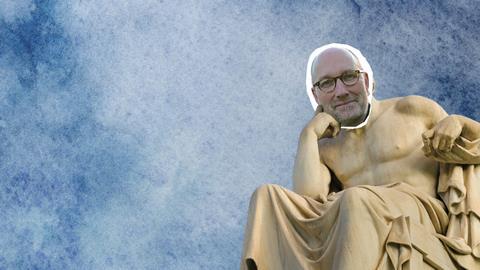

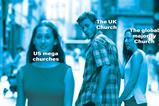

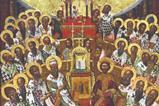





















No comments yet